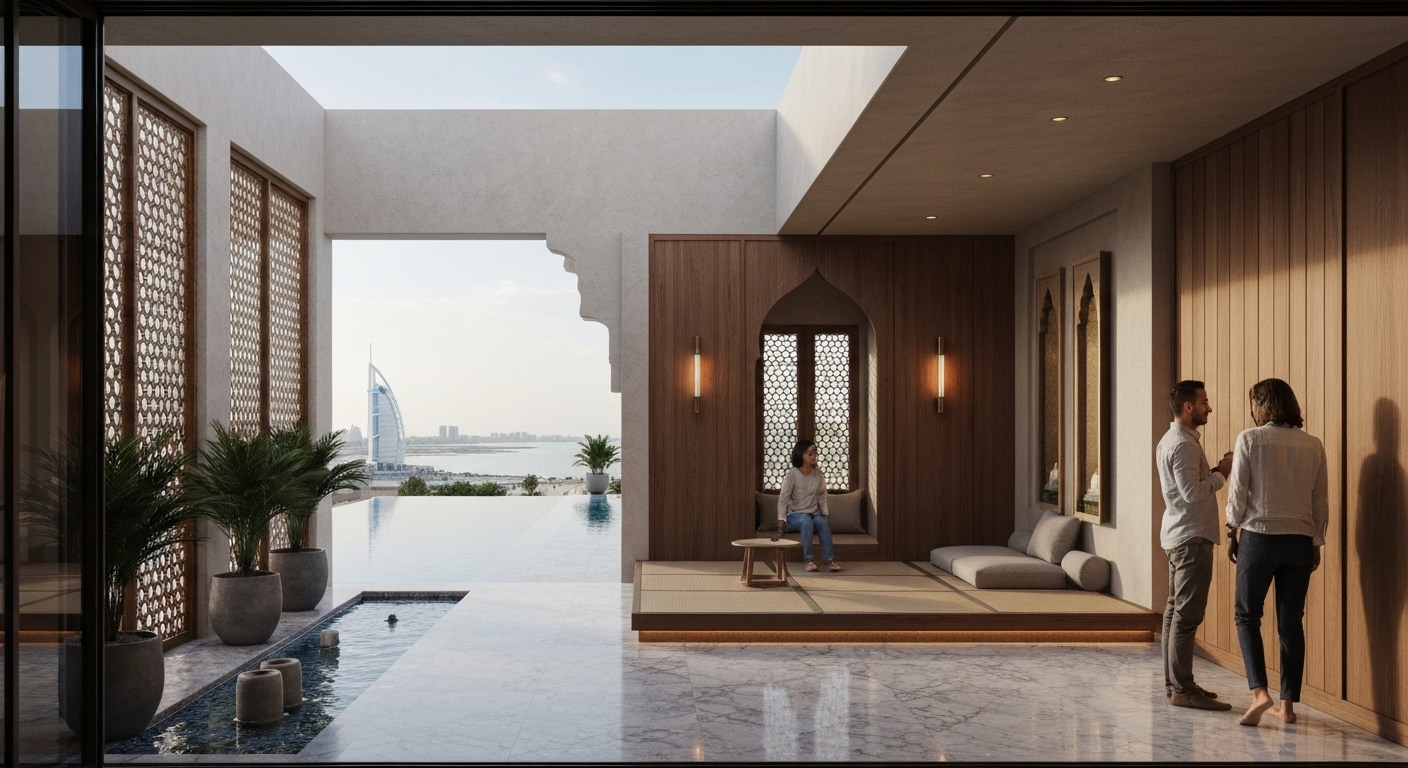Dubai’s luxury real estate market has evolved into a sophisticated ecosystem that recognizes the diverse cultural needs of international high-net-worth individuals. As global wealth continues to flow into the emirate, developers are increasingly focusing on bespoke solutions that honor cultural heritage while embracing modern luxury.
Understanding the International HNI in Dubai’s Luxury Market
The international HNI segment in Dubai represents a diverse tapestry of cultures, from European aristocracy to Asian business dynasties and Middle Eastern royalty. These discerning buyers seek more than just premium properties – they demand residences that reflect their cultural identity, lifestyle preferences, and family traditions. The Dubai luxury market has responded by offering unprecedented levels of customization, allowing buyers to create homes that seamlessly blend their heritage with contemporary elegance.
Modern luxury buyers understand that a truly exclusive property must be more than architecturally impressive; it must serve as a cultural sanctuary that honors their background while providing world-class amenities. This shift in buyer expectations has driven developers to reimagine the concept of luxury living.
Key Cultural Influences on Luxury Home Design and Features in Dubai
Cultural preferences significantly impact design decisions in luxury residences. Middle Eastern buyers often prioritize family-centric layouts with dedicated majlis areas for hosting guests, while European clients may favor open-plan living spaces with emphasis on natural light and outdoor integration. Asian buyers frequently request feng shui-compliant orientations and dedicated spaces for ancestral worship or meditation.
Privacy requirements vary dramatically across cultures. Some buyers require separate entrances for family and guests, while others prioritize panoramic views and social spaces. Kitchen designs reflect cultural cooking traditions – from specialized tandoor installations to traditional Chinese wok stations or European-style wine cellars with temperature-controlled storage.
Religious and spiritual considerations also play crucial roles. Prayer rooms oriented toward Mecca, meditation spaces, or private chapels are increasingly common requests that developers must accommodate thoughtfully.
The Art of Customization: Tailoring Your Dubai Residence to Your Lifestyle and Heritage
Successful customization begins with understanding that luxury is deeply personal. Master bedrooms might incorporate traditional Japanese tatami areas, while living spaces could feature handcrafted Italian marble or intricate Islamic geometric patterns. Technology integration varies by cultural comfort levels – some buyers embrace fully automated smart homes, while others prefer selective technology implementation.
Outdoor spaces offer tremendous customization potential. Rooftop gardens can be designed according to traditional principles – from English country gardens to Japanese zen spaces or Arabian courtyards with water features that provide cooling and tranquility.
Material selection becomes an expression of cultural identity. Buyers might choose specific stone types that connect to their homeland, traditional wood species for flooring, or metals that hold cultural significance.
Navigating Diverse Cultural Demands: A Developer’s Perspective on Bespoke Solutions
Leading developers have assembled multicultural design teams capable of interpreting diverse aesthetic preferences and functional requirements. This involves collaboration with international artisans, specialized craftspeople, and cultural consultants who ensure authenticity in design implementation.
The challenge lies in balancing individual cultural preferences with local building regulations and climate considerations. Successful projects require extensive consultation periods where buyers can communicate their vision while receiving expert guidance on technical feasibility and regulatory compliance.
Legal and Practical Considerations for International Buyers Seeking Customization
Dubai’s legal framework supports extensive property customization, but international buyers must understand the regulatory landscape. Building permits for significant modifications require proper documentation, and certain structural changes may need additional approvals.
Timeline management becomes crucial when incorporating custom elements that require international sourcing or specialized craftsmanship. Buyers should factor additional time for unique materials or artwork that must be imported and installed by qualified professionals.
Showcasing Danube Properties’ Commitment to Culturally Sensitive Customization
Danube Properties has established itself as a leader in culturally responsive luxury development. The company’s approach involves extensive consultation processes that begin during the design phase, allowing buyers to influence their future homes’ fundamental character rather than simply selecting finishes.
The developer’s portfolio demonstrates successful integration of diverse cultural elements across multiple projects, showcasing expertise in creating residences that honor international buyers’ heritage while maintaining contemporary luxury standards.
Beyond the Blueprint: Ensuring Your Luxury Dubai Home Reflects Your Identity
Creating a culturally authentic luxury residence requires ongoing collaboration between buyer, developer, and design team. The most successful projects emerge from partnerships where cultural sensitivity guides every decision, from spatial planning to material selection and technological integration.
Dubai’s luxury real estate market continues evolving to meet the sophisticated demands of international HNIs who seek homes that celebrate their cultural identity while embracing the emirate’s cosmopolitan lifestyle. This cultural customization trend represents the future of luxury living – where true exclusivity lies in personal authenticity rather than standardized opulence.




